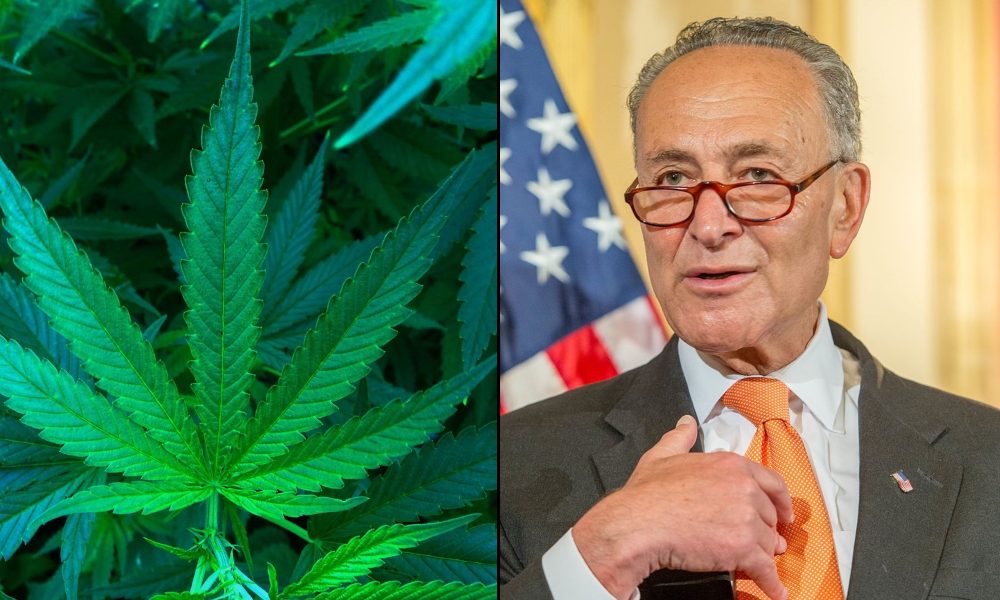Ohio’s vote to legalize marijuana at the ballot on Tuesday is one of the latest examples of how Americans are rejecting “MAGA extremism,” Senate Majority Leader Chuck Schumer (D-NY) says, adding that he’s committed to continuing to work on a bipartisan basis “to keep moving on bipartisan cannabis legislation as soon as we can.”
In a floor speech on Wednesday, the majority leader reviewed Tuesday’s election results, which delivered a number of wins for Democrats. Ohio voters approved initiatives to legalize cannabis and codify abortion rights in the state Constitution, Democratic lawmakers secured majorities in both chambers of the Virginia legislature—which may bolster efforts to legalize marijuana there—and pro-cannabis reform Kentucky Gov. Andy Beshear (D) won reelection, for example.
“In almost every major election, Democratic candidates and Democratic issues prevailed. This continued and strengthened a trend of Democratic victories over the last year,” Schumer said. “There is no possible takeaway from last night other than this: Americans fiercely oppose MAGA extremism, fiercely oppose total abortion bans, and want bipartisan leaders who can put America’s needs first.”
“I hope Republicans in Congress see that after last night, extremism must be rejected and bipartisanship embraced,” he said. “Time will tell if House Republicans choose the right path.”
The leader returned to the marijuana vote at the end of his remarks, touting the “strong support” cannabis legalization enjoyed in Ohio, where about 57 percent of voters approved Issue 2.
“Americans think it’s long past time to enact cannabis reform, so here in the Senate I’ll continue to work with colleagues on both sides—and my good friend Senator Brown—to keep moving on bipartisan cannabis legislation as soon as we can,” Schumer said.
With strong support, the people of Ohio have voted to legalize the recreational use of marijuana.
Americans think it’s long past time to enact cannabis reform.
As Senate Majority Leader, I’ll keep working to move forward on cannabis legislation as soon as we can.
— Chuck Schumer (@SenSchumer) November 8, 2023
The senator seemed to be giving a nod to a bipartisan cannabis banking bill that cleared the Senate Banking Committee chaired by Sen. Sherrod Brown (D-OH), who was among those to vote in favor of the legalization initiative in his home state—though he described it as a a “hard decision” but one that was based on his belief that the reform would promote “safety” for consumers.
Advocates are hoping to see Schumer make good on his pledge to advance the marijuana banking legislation soon, as it’s currently pending action on the Senate floor before potentially being sent over to the GOP-controlled House.
Schumer recently said that he is continuing to “monitor” the progress of the Secure and Fair Enforcement Regulation (SAFER) Banking Act that he intends to amend to include “criminal justice provisions.” And key Senate Republicans say they’re prepared to move forward with the legislation, undeterred by the newly elected anti-marijuana House speaker.
While the majority leader suggested that the cannabis legalization vote in Ohio reflects the “Democratic agenda,” a new Gallup poll shows that the issue is increasingly bipartisan, with a record 70 percent of Americans now backing an end to marijuana prohibition, including 55 percent of Republicans.
What ultimately becomes of Ohio’s marijuana law, meanwhile, is yet to be seen. As a statutory initiative, it could be revised by the legislature—and top Republican lawmakers in the state, as well as prohibitionist groups, are already pushing for various changes.
In the interim, Ohio officials have released an FAQ guide to answer basic questions about the state’s new marijuana legalization law, while noting the possibility that it may be amended by lawmakers.
Congressional Researchers Warn That High Federal Marijuana Taxes Could Inhibit Industry’s Economic Potential
Read the full article here

